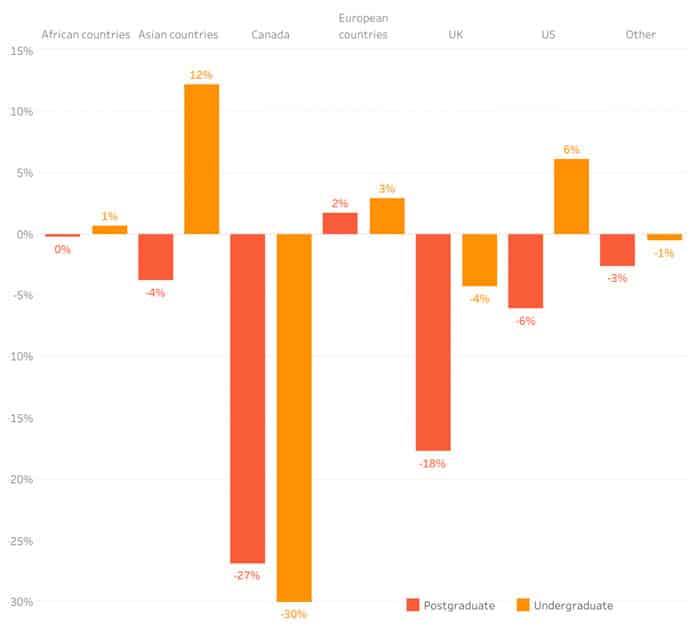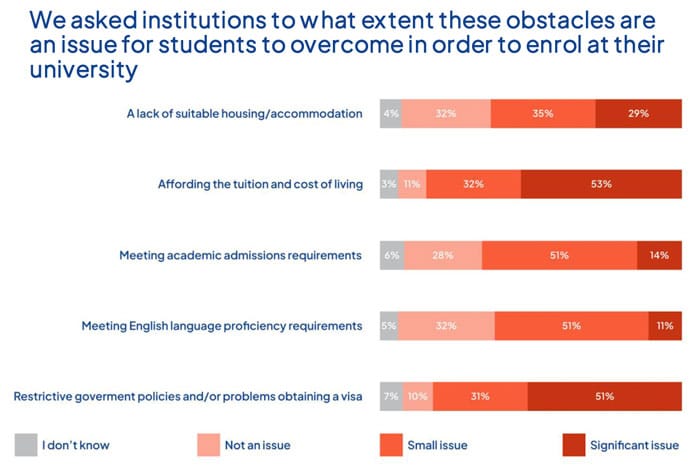New research highlights the impact of policy on international enrolments
- A new global survey shows that many post-secondary institutions are noticing the impact of policy restrictions on enrolments, budgets, and students’ ability to follow through on study abroad plans
- Canadian institutions were far more likely to report enrolment declines and to predict operational disruption than those in other regions
A research collaboration by NAFSA, Oxford Test of English, and Studyportals indicates that institutions around the world are struggling to maintain international enrolments, particularly at the master’s and postgraduate levels, and a significant proportion anticipate budget cuts over the next 12 months. At the heart of the issue for many institutions are immigration policies enacted by their governments.
The inaugural Global Enrolment Benchmark Survey features input from 365 institutions across 66 countries and captures real-time data on international enrolments Sara Pierson, a global director at Oxford Test of English, said the real-time data aspect is intended to “quickly understand changes in global trends and respond with agility.”
The degree to which policy affects universities’ ability to recruit overseas is highlighted by results from Canada, where institutions were more likely than those in other countries to report significant challenges with enrolments and revenues. Canadian immigration rules have changed dramatically over the past year.
Fanta Aw, executive director and CEO of NAFSA said: “The survey results affirm that government policies factor into student choices, by either facilitating or hindering access, and should not be under-estimated.”
Key findings: International enrolments
Globally, four in ten (41%) institutions said that master’s/postgraduate enrolments are down compared with last year’s intake. While 31% have seen a decline in undergraduate enrolments, 38% noted an increase.
The picture changes when we look at country trends. Asian and American institutions are enrolling slightly fewer postgraduate students but are welcoming more undergraduate students. European countries have seen small increases at both levels. Universities in the UK are feeling the pinch of fewer postgraduate students (-18%) but their bachelor’s programmes aren’t too far off last year’s enrolments (-4%).
As you can see in the graph below, Canadian colleges and universities are struggling far more than institutions in other regions at both levels: -27% for postgraduate and -30% at the undergraduate level.
More than 9 in 10 (93%) Canadian universities cited government policies and/or students having problems getting a study visa as a significant issue, while about six in ten UK and US institutions said the same. The global average was 51%.

Edwin van Rest, CEO of Studyportals, considers it possible that policy restrictions in Australia, Canada, and the UK are broadly affecting postgraduate demand from international students:
“Usually, when some destinations face challenges, we see alternatives benefit as students shift their plans. However, the broader drop in postgraduate enrolments in particular suggests that many discouraged students are not simply changing destinations but are instead delaying or even cancelling their study plans altogether. We are seeing that the type of student that was discouraged from going to Canada, UK, or Australia in particular in 2024, often struggle to gain access/visas or find what they are looking for in alternative destinations.”
Key findings: Operational implications
While 22% of institutions globally said that they anticipate budget cuts over the next year, this jumped to 60% in Canada. Similarly, 40% of Canadian institutions foresee significant changes to subjects and programmes compared to a global average of 17%. UK universities were also notably more likely than the average to think budget cuts are likely, with about a third thinking this will happen over the next 12 months.
Key findings: Challenges for students
As shown in the chart below, policy restrictions and costs associated with studying and living are the most problematic barriers right now for students wanting to study abroad, followed by issues with finding suitable housing. Many institutions also said that students meeting academic/English requirements was at least “a small issue” for students trying to enrol in their programmes. Overall, African institutions were most likely of the survey sample to report students having some kind of challenge enrolling with their institution.

NAFSA’s Dr Fanta Aw said:
“The survey not surprisingly shows that affordability, accommodations, and language proficiency in key destinations affect student mobility and must be considered as core elements of student support. This is the first of what we hope will be many surveys and we look forward to a greater number of institutions sharing their data in the future.”
For additional background, please see:
- “Beyond the Big Four: How demand for study abroad is shifting to destinations in Asia and Europe”
- “Agent survey reveals priorities and shifting preferences of international students”
- “Canada Sector Survey says collaboration between governments and institutions are essential to avoid long-term damage to the sector”
















